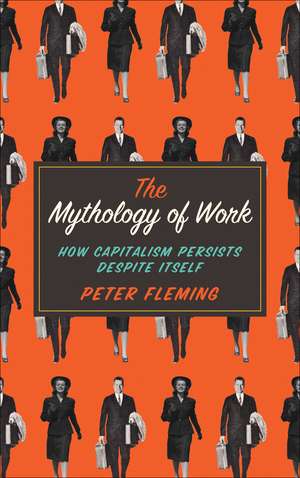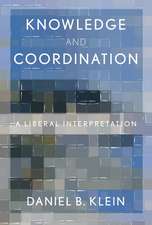The Mythology of Work: How Capitalism Persists Despite Itself
Autor Peter Flemingen Limba Engleză Paperback – 19 mai 2015
Once, work was inextricably linked to survival and self-preservation: the farmer ploughed his land so that his family could eat. In contrast, today work has slowly morphed into a painful and meaningless ritual for many, colonizing almost every part of our day, endless and inescapable.
In The Mythology of Work, Peter Fleming examines how neoliberal society uses the ritual of work—and the threat of its denial—to maintain the late capitalist class order. Work becomes a universal reference point, devoid of any moral or political worth, transforming our society into a factory that never sleeps. Blending critical theory with recent accounts of job-related suicides, office-induced paranoia, fear of relaxation, managerial sadism, and cynical corporate social responsibility campaigns, Fleming paints a bleak picture of a society in which economic and emotional disasters greatly outweigh any professed benefits.
In The Mythology of Work, Peter Fleming examines how neoliberal society uses the ritual of work—and the threat of its denial—to maintain the late capitalist class order. Work becomes a universal reference point, devoid of any moral or political worth, transforming our society into a factory that never sleeps. Blending critical theory with recent accounts of job-related suicides, office-induced paranoia, fear of relaxation, managerial sadism, and cynical corporate social responsibility campaigns, Fleming paints a bleak picture of a society in which economic and emotional disasters greatly outweigh any professed benefits.
Preț: 208.30 lei
Nou
Puncte Express: 312
Preț estimativ în valută:
39.86€ • 43.43$ • 33.59£
39.86€ • 43.43$ • 33.59£
Carte tipărită la comandă
Livrare economică 23 aprilie-07 mai
Preluare comenzi: 021 569.72.76
Specificații
ISBN-13: 9780745334868
ISBN-10: 0745334865
Pagini: 240
Dimensiuni: 133 x 216 x 15 mm
Greutate: 0.32 kg
Editura: PLUTO PRESS
Colecția Pluto Press
ISBN-10: 0745334865
Pagini: 240
Dimensiuni: 133 x 216 x 15 mm
Greutate: 0.32 kg
Editura: PLUTO PRESS
Colecția Pluto Press
Notă biografică
Professor Alastair D. Couper began his career as a Ships Officer and qualified Master Mariner. He then became a Research Scholar working on Pacific Studies at the Australian National University before returning to the UK to take up academic posts at the University of Durham, followed by the University of Cardiff and the World Maritime University in Sweden. His books include Voyages of Abuse (Pluto Press 1999), Seafarers’ Rights (Part One) Oxford University Press 2005, and Sailors and Traders (University of Hawaii Press) 2009. He is on the Board of Seafarers’ Rights International._x000B_Hance D. Smith specialises in Marine Geography and Marine Policy including the development and management of marine fisheries_x000B__x000B_Father Bruno Ciceri is representative of the Apostleship of the Sea International (Vatican City), Chairman of the International Christian Maritime Association, and is a member of the Board of Seafarers’ Rights International. He has worked for many years caring for seafarers and fishers in several countries of Asia. He has published on sea fishers’ conditions and human rights.
Cuprins
Introduction: Once Upon a Time, Man Invented Work ….
1: The Factory That Never Sleeps
2: Planet of Work
3: What is Managerialism?
4: Viral Capitalism in the Bedroom
5: Corporate Ideology as False Truth Telling
6: Critique of Dialogical Reason
Conclusion: Inoperative Critique and the End of Work
References
Index
1: The Factory That Never Sleeps
2: Planet of Work
3: What is Managerialism?
4: Viral Capitalism in the Bedroom
5: Corporate Ideology as False Truth Telling
6: Critique of Dialogical Reason
Conclusion: Inoperative Critique and the End of Work
References
Index
Recenzii
“Fleming's analyses of work critically confront today’s capitalism, now well into its shift from old centers (western Europe, north America and Japan) to new, lower-wage centers (Asia, Latin America, Africa, etc.). The resulting precariousness, scarcity, and mindlessness of work imposed on the old centers is being covered with an ideological fetishization of work that this book well deconstructs.”
“Professor Fleming has established himself as the foremost critic of our generation on the pervasive and pernicious ideologies of business and management. In this, his latest contribution, he dismantles the work ethic and the compulsion of work that plagues all workers, waged and unwaged. This is a clarion call to action against the forces of work that would try to regulate and profit from our collective self-organization.”














